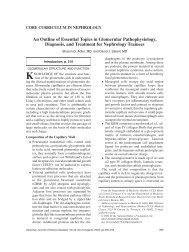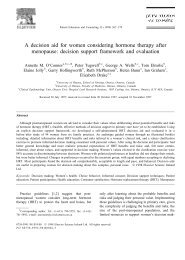- Page 1 and 2:
Surgery and Healing in the Developi
- Page 3 and 4:
Contents Foreword .................
- Page 5 and 6:
25. Dentistry .....................
- Page 7 and 8:
Editor Contributors Harold P. Adolp
- Page 9:
Foreword Surgery and Healing in the
- Page 12 and 13:
“poor, but modern”, as for exam
- Page 14 and 15:
There may be at least one considera
- Page 16 and 17:
It is that higher accountability th
- Page 18 and 19:
1 2 Surgery and Healing in the Deve
- Page 20 and 21:
1 4 Surgery and Healing in the Deve
- Page 22 and 23:
CHAPTER 2 Surgery in Developing Cou
- Page 24 and 25:
2 8 Surgery and Healing in the Deve
- Page 26 and 27:
2 10 Surgery and Healing in the Dev
- Page 28 and 29:
2 12 Surgery and Healing in the Dev
- Page 30 and 31:
3 14 Surgery and Healing in the Dev
- Page 32 and 33:
3 16 Surgery and Healing in the Dev
- Page 34 and 35:
CHAPTER 4 International Surgical Ed
- Page 36 and 37:
4 20 Surgery and Healing in the Dev
- Page 38 and 39:
4 22 Surgery and Healing in the Dev
- Page 40 and 41:
4 24 Surgery and Healing in the Dev
- Page 42 and 43:
5 26 Surgery and Healing in the Dev
- Page 44 and 45:
5 28 Surgery and Healing in the Dev
- Page 46 and 47:
5 30 Surgery and Healing in the Dev
- Page 48 and 49:
5 32 Surgery and Healing in the Dev
- Page 50 and 51:
6 34 Surgery and Healing in the Dev
- Page 52 and 53:
6 36 Surgery and Healing in the Dev
- Page 54 and 55:
6 38 Surgery and Healing in the Dev
- Page 56 and 57:
6 40 Surgery and Healing in the Dev
- Page 58 and 59:
6 42 Surgery and Healing in the Dev
- Page 60 and 61:
6 44 Surgery and Healing in the Dev
- Page 62 and 63:
6 46 Surgery and Healing in the Dev
- Page 64 and 65:
6 48 Surgery and Healing in the Dev
- Page 66 and 67:
6 50 Surgery and Healing in the Dev
- Page 68 and 69:
6 52 Surgery and Healing in the Dev
- Page 70 and 71:
7 54 Surgery and Healing in the Dev
- Page 72 and 73:
7 56 Surgery and Healing in the Dev
- Page 74 and 75:
7 58 Surgery and Healing in the Dev
- Page 76 and 77:
8 60 Surgery and Healing in the Dev
- Page 78 and 79:
8 62 Surgery and Healing in the Dev
- Page 80 and 81:
8 64 Surgery and Healing in the Dev
- Page 82 and 83:
8 66 Surgery and Healing in the Dev
- Page 84 and 85:
CHAPTER 9 Lab-in-a-Suitcase: Saving
- Page 86 and 87:
9 70 Surgery and Healing in the Dev
- Page 88 and 89:
10 72 Surgery and Healing in the De
- Page 90 and 91:
10 74 Surgery and Healing in the De
- Page 92 and 93:
10 76 Surgery and Healing in the De
- Page 94 and 95:
10 78 Surgery and Healing in the De
- Page 96 and 97:
10 80 Surgery and Healing in the De
- Page 98 and 99:
10 82 Surgery and Healing in the De
- Page 100 and 101:
10 84 Surgery and Healing in the De
- Page 102 and 103:
10 86 Surgery and Healing in the De
- Page 104 and 105:
11 88 Surgery and Healing in the De
- Page 106 and 107:
11 90 Surgery and Healing in the De
- Page 108 and 109:
CHAPTER 12 Communication in the Thi
- Page 110 and 111:
12 94 Surgery and Healing in the De
- Page 112 and 113:
12 96 Surgery and Healing in the De
- Page 114 and 115:
CHAPTER 13 Anesthesia in the Third
- Page 116 and 117:
13 100 Surgery and Healing in the D
- Page 118 and 119: 13 102 Surgery and Healing in the D
- Page 120 and 121: 13 104 Surgery and Healing in the D
- Page 122 and 123: 13 106 Surgery and Healing in the D
- Page 124 and 125: 13 108 Surgery and Healing in the D
- Page 126 and 127: 14 110 Surgery and Healing in the D
- Page 128 and 129: 14 112 Surgery and Healing in the D
- Page 130 and 131: 14 114 Surgery and Healing in the D
- Page 132 and 133: 14 116 Surgery and Healing in the D
- Page 134 and 135: CHAPTER 15 Basic Obstetrics and Obs
- Page 136 and 137: 15 120 Surgery and Healing in the D
- Page 138 and 139: 15 122 Surgery and Healing in the D
- Page 140 and 141: 15 124 Surgery and Healing in the D
- Page 142 and 143: 15 126 Surgery and Healing in the D
- Page 144 and 145: 15 128 Surgery and Healing in the D
- Page 146 and 147: 15 130 Surgery and Healing in the D
- Page 148 and 149: 15 132 Surgery and Healing in the D
- Page 150 and 151: 15 134 Surgery and Healing in the D
- Page 152 and 153: 15 136 Surgery and Healing in the D
- Page 154 and 155: 15 138 Surgery and Healing in the D
- Page 156 and 157: 15 140 Surgery and Healing in the D
- Page 158 and 159: 15 142 Surgery and Healing in the D
- Page 160 and 161: CHAPTER 16 Pointers for American Su
- Page 162 and 163: 16 146 Surgery and Healing in the D
- Page 164 and 165: 16 148 Surgery and Healing in the D
- Page 166 and 167: 16 150 Surgery and Healing in the D
- Page 170 and 171: 17 154 Surgery and Healing in the D
- Page 172 and 173: 17 156 Surgery and Healing in the D
- Page 174 and 175: 17 158 Surgery and Healing in the D
- Page 176 and 177: 17 160 Surgery and Healing in the D
- Page 178 and 179: 17 162 Surgery and Healing in the D
- Page 180 and 181: 17 164 Surgery and Healing in the D
- Page 182 and 183: 17 166 Surgery and Healing in the D
- Page 184 and 185: 18 168 Surgery and Healing in the D
- Page 186 and 187: 18 170 Surgery and Healing in the D
- Page 188 and 189: 18 172 Surgery and Healing in the D
- Page 190 and 191: 18 174 Surgery and Healing in the D
- Page 192 and 193: 18 176 Surgery and Healing in the D
- Page 194 and 195: 19 178 Surgery and Healing in the D
- Page 196 and 197: 19 180 Surgery and Healing in the D
- Page 198 and 199: 19 182 Surgery and Healing in the D
- Page 200 and 201: 19 184 Surgery and Healing in the D
- Page 202 and 203: CHAPTER 20 Chronic Pyogenic Osteomy
- Page 204 and 205: 20 188 Surgery and Healing in the D
- Page 206 and 207: 20 190 Surgery and Healing in the D
- Page 208 and 209: 21 192 Surgery and Healing in the D
- Page 210 and 211: 21 194 Surgery and Healing in the D
- Page 212 and 213: 22 196 Surgery and Healing in the D
- Page 214 and 215: 22 198 Surgery and Healing in the D
- Page 216 and 217: CHAPTER 23 Cleft Lip and Palate Sur
- Page 218 and 219:
23 202 Surgery and Healing in the D
- Page 220 and 221:
23 204 Surgery and Healing in the D
- Page 222 and 223:
23 206 Surgery and Healing in the D
- Page 224 and 225:
23 208 Surgery and Healing in the D
- Page 226 and 227:
23 210 Surgery and Healing in the D
- Page 228 and 229:
23 212 Surgery and Healing in the D
- Page 230 and 231:
23 214 Surgery and Healing in the D
- Page 232 and 233:
23 216 Surgery and Healing in the D
- Page 234 and 235:
CHAPTER 24 Outreach Dentistry: A Wo
- Page 236 and 237:
24 220 Surgery and Healing in the D
- Page 238 and 239:
24 222 Surgery and Healing in the D
- Page 240 and 241:
24 224 Surgery and Healing in the D
- Page 242 and 243:
24 226 Surgery and Healing in the D
- Page 244 and 245:
24 228 Surgery and Healing in the D
- Page 246 and 247:
24 230 Surgery and Healing in the D
- Page 248 and 249:
24 232 Surgery and Healing in the D
- Page 250 and 251:
25 234 Surgery and Healing in the D
- Page 252 and 253:
25 236 Surgery and Healing in the D
- Page 254 and 255:
25 238 Surgery and Healing in the D
- Page 256 and 257:
25 240 Surgery and Healing in the D
- Page 258 and 259:
CHAPTER 1 CHAPTER 26 Reconstructive
- Page 260 and 261:
Reconstructive Surgery in the Tropi
- Page 262 and 263:
Reconstructive Surgery in the Tropi
- Page 264 and 265:
Reconstructive Surgery in the Tropi
- Page 266 and 267:
Reconstructive Surgery in the Tropi
- Page 268 and 269:
Reconstructive Surgery in the Tropi
- Page 270 and 271:
Reconstructive Surgery in the Tropi
- Page 272 and 273:
Reconstructive Surgery in the Tropi
- Page 274 and 275:
Reconstructive Surgery in the Tropi
- Page 276 and 277:
Reconstructive Surgery in the Tropi
- Page 278 and 279:
Reconstructive Surgery in the Tropi
- Page 280 and 281:
Reconstructive Surgery in the Tropi
- Page 282 and 283:
Reconstructive Surgery in the Tropi
- Page 284 and 285:
Reconstructive Surgery in the Tropi
- Page 286 and 287:
Reconstructive Surgery in the Tropi
- Page 288 and 289:
Reconstructive Surgery in the Tropi
- Page 290 and 291:
Reconstructive Surgery in the Tropi
- Page 292 and 293:
CHAPTER 1 CHAPTER 27 Factors Influe
- Page 294 and 295:
Distribution and Incidence of Tropi
- Page 296 and 297:
Distribution and Incidence of Tropi
- Page 298 and 299:
Distribution and Incidence of Tropi
- Page 300 and 301:
CHAPTER 1 CHAPTER 28 Population Dyn
- Page 302 and 303:
Population Dynamics Of Surgical Tro
- Page 304 and 305:
Metabolic Maladaptation 289 Introdu
- Page 306 and 307:
Metabolic Maladaptation 291 some of
- Page 308 and 309:
Metabolic Maladaptation 293 In this
- Page 310 and 311:
Metabolic Maladaptation Table 1. Si
- Page 312 and 313:
Metabolic Maladaptation Table 4. Go
- Page 314 and 315:
Metabolic Maladaptation 299 the rev
- Page 316 and 317:
Metabolic Maladaptation Table 5. As
- Page 318 and 319:
Metabolic Maladaptation Table 6. Co
- Page 320 and 321:
Metabolic Maladaptation 305 the ris
- Page 322 and 323:
Metabolic Maladaptation Table 8. Go
- Page 324 and 325:
Metabolic Maladaptation Table 10. G
- Page 326 and 327:
Metabolic Maladaptation Table 12. C
- Page 328 and 329:
Metabolic Maladaptation 313 cell an
- Page 330 and 331:
Metabolic Maladaptation 315 Biologi
- Page 332 and 333:
Metabolic Maladaptation 317 from io
- Page 334 and 335:
Metabolic Maladaptation 319 25. Lon
- Page 336 and 337:
CHAPTER 1 CHAPTER 30 Nutrition and
- Page 338 and 339:
Nutrition and Development in Africa
- Page 340 and 341:
CHAPTER 1 CHAPTER 31 Uterine Ruptur
- Page 342 and 343:
Uterine Ruptures in Rural Zaire Tab
- Page 344 and 345:
Uterine Ruptures in Rural Zaire 329
- Page 346 and 347:
CHAPTER 1 CHAPTER 32 Vesicovaginal
- Page 348 and 349:
Vesicovaginal Fistula in Democratic
- Page 350 and 351:
CHAPTER 1 CHAPTER 33 Ophthalmology
- Page 352 and 353:
Ophthalmology Figure 2. Refractive
- Page 354 and 355:
Ophthalmology Figure 4. A tonometer
- Page 356 and 357:
Ophthalmology 341 ml of 40 mg/ml IV
- Page 358 and 359:
Ophthalmology Figure 6. Axis determ
- Page 360 and 361:
Ophthalmology 345 thalmic set prepa
- Page 362 and 363:
Ophthalmology 347 Procedures Region
- Page 364 and 365:
Accommodating Deficits in Material
- Page 366 and 367:
Accommodating Deficits in Material
- Page 368 and 369:
Accommodating Deficits in Material
- Page 370 and 371:
Accommodating Deficits in Material
- Page 372 and 373:
Accommodating Deficits in Material
- Page 374 and 375:
Abscesses and Other Infections Trea
- Page 376 and 377:
Abscesses and Other Infections Trea
- Page 378 and 379:
Abscesses and Other Infections Trea
- Page 380 and 381:
Abscesses and Other Infections Trea
- Page 382 and 383:
Abscesses and Other Infections Trea
- Page 384 and 385:
Abscesses and Other Infections Trea
- Page 386 and 387:
Abscesses and Other Infections Trea
- Page 388 and 389:
Abscesses and Other Infections Trea
- Page 390 and 391:
Abscesses and Other Infections Trea
- Page 392 and 393:
Abscesses and Other Infections Trea
- Page 394 and 395:
CHAPTER 1 CHAPTER 36 Surgical Train
- Page 396 and 397:
Surgical Training of Nurses for Rur
- Page 398 and 399:
Surgical Training of Nurses for Rur
- Page 400 and 401:
Surgical Training of Nurses for Rur
- Page 402 and 403:
Training of Medical Assitants in Mo
- Page 404 and 405:
CHAPTER 1 CHAPTER 38 Training Surge
- Page 406 and 407:
Training Surgeons in the Developing
- Page 408 and 409:
Training Surgeons in the Developing
- Page 410 and 411:
Training Surgeons in the Developing
- Page 412 and 413:
Training Surgeons in the Developing
- Page 414 and 415:
Training Surgeons in the Developing
- Page 416 and 417:
Training Surgeons in the Developing
- Page 418 and 419:
Training Surgeons in the Developing
- Page 420 and 421:
Mobile Surgery Figure 1. 405 of tec
- Page 422 and 423:
Mobile Surgery Figure 3. 407 Childr
- Page 424 and 425:
Mobile Surgery 409 We have realized
- Page 426 and 427:
CHAPTER 1 CHAPTER 40 Public Health
- Page 428 and 429:
Public Health Problems on Burma Fro
- Page 430 and 431:
Public Health Problems on Burma Fro
- Page 432 and 433:
Public Health Problems on Burma Fro
- Page 434 and 435:
Medical Adventures in the Nigerian
- Page 436 and 437:
Medical Adventures in the Nigerian
- Page 438 and 439:
Medical Adventures in the Nigerian
- Page 440 and 441:
Medical Adventures in the Nigerian
- Page 442 and 443:
Medical Adventures in the Nigerian
- Page 444 and 445:
CHAPTER 1 CHAPTER 42 Wanted Glenn G
- Page 446 and 447:
Wanted 431 Studies Center (//www.am
- Page 448 and 449:
Wanted 433 MacArthur (The John D. a
- Page 450 and 451:
Wanted 435 most pathologic presenta
- Page 452 and 453:
Wanted 437 “outliers” in the he
- Page 454 and 455:
World Health 439 challenge: name fo
- Page 456 and 457:
CHAPTER 1 CHAPTER 44 Treating Other
- Page 458 and 459:
Treating Others: Human Sciences in
- Page 460 and 461:
Treating Others: Human Sciences in
- Page 462 and 463:
CHAPTER 1 CHAPTER 45 The Impact of
- Page 464 and 465:
The Impact of a Volunteer Medical M
- Page 466 and 467:
The Impact of a Volunteer Medical M
- Page 468 and 469:
The Impact of a Volunteer Medical M
- Page 470 and 471:
The Impact of a Volunteer Medical M
- Page 472 and 473:
The Impact of a Volunteer Medical M
- Page 474 and 475:
The Impact of a Volunteer Medical M
- Page 476 and 477:
CHAPTER 1 CHAPTER 46 Field Notes on
- Page 478 and 479:
Field Notes on a Typical Day in a H
- Page 480 and 481:
Field Notes on a Typical Day in a H
- Page 482 and 483:
Field Notes on a Typical Day in a H
- Page 484 and 485:
Field Notes on a Typical Day in a H










